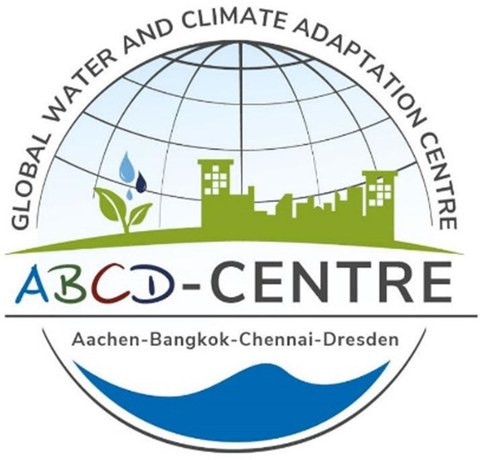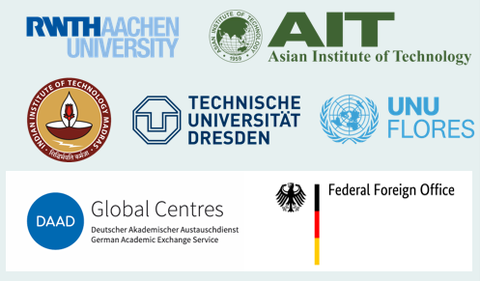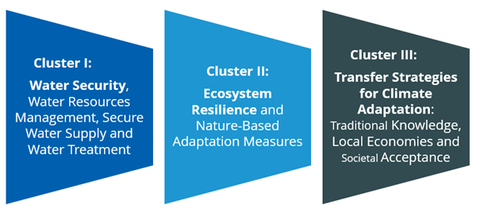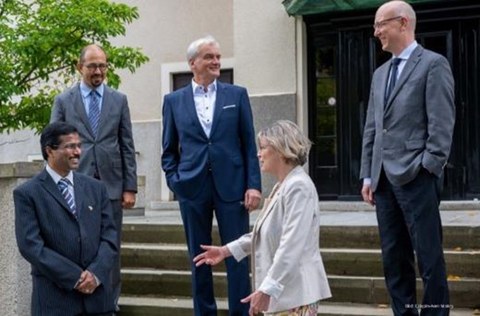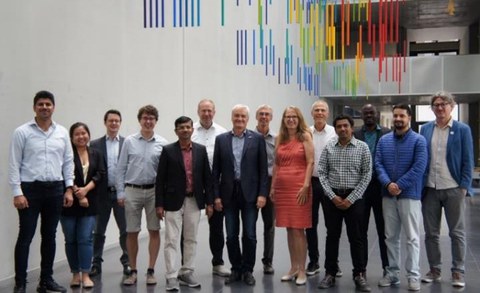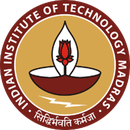Global Water and Climate Adaptation Centre
Table of contents
Brief description
A Collaborative Response to Climate Change and Water Security
The pressing challenges of water security and climate change adaptation demand innovative solutions and robust international cooperation. The Global Water and Climate Adaptation Centre (ABCD-Centre) embodies this spirit through a unique partnership uniting RWTH Aachen University, the Asian Institute of Technology Bangkok (AITB), the Indian Institute of Technology Madras (IITM), TUD Dresden University of Technology (TUD) and United Nations University - Institute for Integrated Management of Material Fluxes and Resources (UNU-FLORES). Supported by the German Academic Exchange Service (DAAD) and funded by the Federal Foreign Office, the centre is a cornerstone of the DAAD's Global Centers for Climate and Environment initiative.
Focusing on humanity's adaption to the far-reaching impacts of climate change, particularly concerning water, the ABCD-Centre promotes global dialogue, transforms research into actionable practices, and prepares the next generation of environmental leaders.
At the heart to the Centre's mission is the achievement of the Sustainable Development Goals (SDGs), specifically SDG-6, which ensures the "availability and sustainable management of water and sanitation for all". The Centre recognizes clean water and sanitation as fundamental human rights and emphasizes their pivotal role in driving progress on interrelated global goals.
Through cutting-edge research, interdisciplinary education and practical knowledge transfer, the ABCD-Centre is at the forefront of addressing global challenges in water security and climate adaptation.
Structure
The ABCD-Centre takes a holistic approach to addressing global water and climate challenges by integrating education, research and practical applications. Through the joint Master's program in Water Security and Global Change, students develop interdisciplinary expertise while gaining exposure to diverse academic and cultural perspectives. This program emphasizes hands-on experience in both developed and developing regions, empowering graduates to tackle urgent water and climate issues effectively.
Innovation lies at the heart of the Centre's mission, driven by collaborative research projects, postdoctoral opportunities, and dynamic knowledge exchange. The Centre translates cutting-edge research into actionable solutions through initiatives like the Living Lab program, which bridges theory and practice. Additionly, public engagement and partnerships with stakeholders play a key role in crafting strategies for climate resilience and sustainable adaptation.
Global impact
Since its inception, the ABCD-Centre has significantly advanced the fields of water security and climate adaptation. With various research publications on topics such as water security, ecosystem resilience and climate adaptation, the Centre has also taken a leading role in organizing and participating in major global events, including the 2023 World Water Council Assembly (WSCA) and the 2023 UN Water Conference.
The ABCD-Centre is equally committed to fostering knowledge between the Global North and South through its scholarship programs. Scholarships have been awarded to professors and senior researchers from the Global South to enable their collaboration with German partner universities (RWTH Aachen, TU Dresden and UNU-FLORES). Additionly, many scholarships were granted to master and doctoral students from Germany to study in India and Thailand. The Future Environmental Leaders Scholarship further supported scholars at German partner universities as part of its 2023 cohort, reinforcing the Centre's mission to cultivate global expertise and collaboration in climate resilience and sustainable water management.
Joint Master's Program - Water Security & Global Change
The Joint Master's Program in Water Security and Global Change, the first joint degree program between Germany and India, is a pioneering international initiative designed to tackle pressing global water challenges. This unique program provides students the opportunity to study across both the Global South and the Global North, benefiting from the expertise of leading institutions: IIT Madras, TU Dresden, RWTH Aachen, UNU-FLORES and AIT Bangkok. Graduates of the program receive a prestigious joint degree that reflects the program's emphasis on interdisciplinary learning and global collaboration.

Figure: The Structure of the Joint Master's Program - Water Security & Global Change
Living Lab: Connecting theory and practice
The Living Lab is a research initiative that employs a multidisciplinary approach to facilitate the transfer of knowledge into actionable insights.
At the core of the ABCD-Centre's transfer strategy is the Living Lab, which combines physical and virtual spaces to address real-world climate adaptation challenges. The Living Lab uses a combination of advanced digital tools and traditional knowledge systems to investigate urban processes, water dynamics and climate resilience strategies in a practical setting. The results of this research inform the development of sustainable interventions and foster dialogue between researchers, policy makers and communities.
For more information visit the ABCD-Centre website (https://abcd-centre.org/).
Project data
|
Website |
|
|
Time period |
2021- 2025 |
|
Type of funding |
Third-party |
|
Funding provider |
DAAD |
|
TUD Research Priority Areas |
Water Security and Climate Adaptation, Hydraulic Engineering and Environment - Water Research |
|
Sustainable Development Goals (SDGs) |
SDG 6 - Clean water and sanitation SDG 11 - Sustainable cities and communities SDG 13 - Climate action |
|
Keywords |
ABCD, Water Security, Joint Master, Future Environmental Leaders |
Project Manager
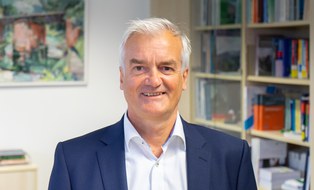 © Andrè Terpe
© Andrè Terpe
Professor
NameMr Prof. Dr.-Ing. Jürgen Stamm
Head of Inst., Chair Hyd. Eng. & School of Civ. & Environ. Eng.
Send encrypted email via the SecureMail portal (for TUD external users only).
Office of the Chair of Hydraulic Engineering
Visiting address:
Beyer-Bau, Room 04-22 George-Bähr-Str. 1
01069 Dresden
Office hours:
Appointments only by prior arrangement (phone or email)
Project officer
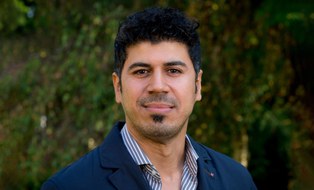 © TU Dresden
© TU Dresden
ABCD-Centre Coordinator (former)
NameMr Dr.-Ing. Firas Aljanabi
Send encrypted email via the SecureMail portal (for TUD external users only).
Chair of Hydraulic Engineering Secretariat
Visiting address:
Beyer-Bau, Raum 04-13 George-Bähr-Str. 1
01069 Dresden
Project partner
|
Project partner |
Type |
Website |
|
TUD Dresden |
Internal |
|
|
RWTH Aachen University |
External |
|
|
AIT Bangkok |
External |
|
|
IIT MADRAS |
External |
|
|
UNU-FLORES |
External |
Publications
Naing, P.M., Babel, M.S., Karthe, D., Stamm, J., 2024. Analysis of the water-energy-carbon nexus for sustainable development of the selected industries. Sustain. Dev. 1-25 (Article). https://doi.org/https://doi.org/10.1002/sd.2994
Chapagain, K., Babel, M.S., Karthe, D., Stamm, J., 2024. Integrated assessment of water-energy-food nexus: conceptual framework and application to the Ping River basin, Thailand. Int. J. Water Resour. Dev. 40, 284-318 (Article). https://doi.org/10.1080/07900627.2023.2252529
Lindner, A., Stamm, J., Günther, E., Babel, M., Barseghyan, H. Fukushi, K. (2023): Water security and climate change adaptation as local challenges with global importance - addressing the gap between knowledge generation and best practice application. UN 2023 Water Conference. (Article)
Schüttrumpf, H., Stamm, J., Zimmermann, R., Diederich, S. (2022): The Global Water and Climate Adaptation Center. In: Water and Waste, 2022 (5). (Article)
Aljanabi, F., Stamm, J., DR. Danish, S.A., Sannasiraj (2023), Water Security between Global South and Global North, Partnerships for Sustainable Solutions. In: Water Security and Climate Adaptation Conference WSCA2023. (Conference article)
Aljanabi, F., Stamm, J.,(2023), Temporal Rainfall Disaggregation and High-Resolution Data Generation: A Study in the Temperate Oceanic Climate Region. In: Water Security and Climate Adaptation Conference WSCA2023. (Conference article)
Ahmed, F., Loc, H.H., Babel, M.S., Stamm, J., 2024. A community-scale study on nature-based solutions (NBS) for stormwater management under tropical climate: The case of the Asian Institute of Technology (AIT), Thailand. J. Hydroinformatics jh2024288 (Article). https://doi.org/10.2166/hydro.2024.288
Matovu, B., Brouwer, F. , Bleischwitz, R., Aljanabi, F., Meltem Alkoyak- Yildiz 2024. Resource nexus perspectives in the Blue Economy of India: The case of sand mining in Kerala, Environmental Science & Policy, Volume 151, January 2024, 103617. (Article)
Aljanabi, F., Guemar, S., Krebs, P. and Stamm, J. (2022): Precipitation Disaggregated Datasets Evaluation and Its Performance in the Storm Water Management Model SWMM. In: WSCC 2022. (open access) (Conference article)
Schüttrumpf, H., Stamm, J., Zimmermann, R., Diederich, S. (2022): The Global Water and Climate Adaptation Center. In: Water and Waste, 2022 (5). (Article)
Fleischer, D., Arns, A. & Stamm, J. (2022): "Climate Adaptation along the German Coast of the Baltic Sea" in proceedings of the 23rd Congress of IAHR-APD. (Conference article)
Aljanabi, F., Stamm, J., DR. Danish, S.A., Sannasiraj (2023), Water Security between Global South and Global North, Partnerships for Sustainable Solutions. In: Water Security and Climate Adaptation Conference WSCA2023. (Conference article)
Aljanabi, F., Stamm, J.,(2023), Temporal Rainfall Disaggregation and High-Resolution Data Generation: A Study in the Temperate Oceanic Climate Region. In: Water Security and Climate Adaptation Conference WSCA2023. (Conference article)
 © Firas Aljanabi
© Firas Aljanabi
 © Firas Aljanabi
© Firas Aljanabi
Promotion
 © Firas Aljanabi
© Firas Aljanabi

